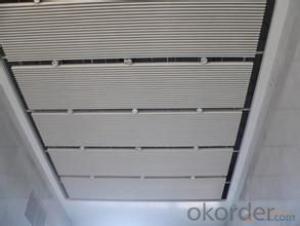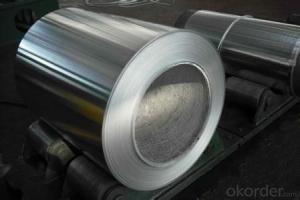Alu coil for ceilling
- Loading Port:
- China Main Port
- Payment Terms:
- TT OR LC
- Min Order Qty:
- -
- Supply Capability:
- -
OKorder Service Pledge
OKorder Financial Service
You Might Also Like
Aluminium is a relatively soft, durable, lightweight, ductileand malleablemetalwith appearance ranging from silvery to dull gray, depending on the surfaceroughness. It is nonmagnetic and does not easily ignite. A fresh film ofaluminium serves as a good reflector (approximately 92%) of visible lightand an excellent reflector (as much as 98%) of medium and far infraredradiation. The yield strength of pure aluminium is 7–11 MPa,while aluminium alloys have yield strengths ranging from200 MPa to 600 MPa. Aluminium has about one-third the densityand stiffness of steel. It is easily machined,cast, drawn and extruded.
Aluminium alloys (or aluminum alloys; see spellingdifferences) are alloysin which aluminium(Al) is the predominant metal. The typical alloying elements are copper, magnesium,manganese,silicon,tin and zinc. There are twoprincipal classifications, namely casting alloys and wrought alloys, both of which are furthersubdivided into the categories heat-treatableand non-heat-treatable. About 85% of aluminium is used for wrought products,for example rolled plate, foils and extrusions.Cast aluminium alloys yield cost-effective products due to the low meltingpoint, although they generally have lower tensile strengthsthan wrought alloys. The most important cast aluminium alloy system is Al–Si,where the high levels of silicon (4.0–13%) contribute to give good castingcharacteristics. Aluminium alloys are widely used in engineering structures andcomponents where light weight or corrosion resistance is required
Specification:
Alloy: AA1050, 1060, 1100,AA3003, 3005, 3015, 5052, 5754, 5083,8011, etc
Temper:H14/16/18/22/24/32, HO etc.
Thickness:0.2mm—100mm
Width: 100mm—2300mm (Can be slitted)
InnerDiameter: 508MM
Coil Weight:500kg-3000kg(Max.)
Application:Foil stock, Circles, Roofing, Can stock, Marine plate,Anti-slipery purpose in vehicles, packing and appliance.
Features:
1. Excellent quality of products
2. Quick delivery
3. Best service to clients
4. BV,SGS avalible
5. No buckle o waveness
6. Tension leveling
7. Certificate of Origin
8. Form A,E
Packaging Detail:
Carton ,Woodenpallet with plastic protection packing ,standard seaworthy packing or as yourrequest.
ProductionCapacity:
AnnualProduction capacity of 600,000 tons.
Products areexported to United States, Canada, U.A.E, Brazil, Mexico,Thailand, Vietnam,Nigeria etc, over 100 countries andregions all over the world.
Production Line:
CNBM aluminumproduction base is comprised of 18 aluminumannealers, 10 coil and foilmills, 4 continuous production lines, 2hot rolling production line and 3prepainted lines.
FAQ:
1. What is the form of payment?
Normally 30% TT, L/C
2. Type of quotation?
FOB, CFR, CIF
3. Port of loading?
Shanghai port
4. Delivery time?
30 day after client’s deposit
- Q:Can aluminum coils be used in the production of aircraft fuel tanks?
- Yes, aluminum coils can be used in the production of aircraft fuel tanks. Aluminum is a lightweight and durable material that is commonly used in the aerospace industry due to its high strength-to-weight ratio. Its corrosion-resistant properties also make it an ideal choice for fuel tanks, as it can withstand the harsh conditions and chemicals found in aviation fuel. The use of aluminum coils allows for efficient manufacturing processes, as they can be easily formed and welded into the desired tank shape. Additionally, aluminum has excellent thermal conductivity, which helps dissipate heat generated during flight and prevents the fuel from overheating. Overall, aluminum coils are a suitable and widely-used material in the production of aircraft fuel tanks.
- Q:What are some normal everyday products made from aluminum that I can use to recycle?
- Soda cans. Beer cans. Pie tins. Aluminum foil. Traffic signs. A few components of some automobiles like the hood (bonnet) and the cylinder heads for some engines. Airplanes - most all the structure metal and all the skins in all but the newest composite (fiberglass) planes. Aluminum recycling uses so much less energy than refining from bauxite ore that a high percentage of aluminum gets recycled.
- Q:How are aluminum coils tested for mechanical properties?
- Aluminum coils are typically tested for mechanical properties through various methods such as tensile testing, hardness testing, and bend testing. Tensile testing involves subjecting a sample of the coil to tension until it breaks, allowing for the measurement of its yield strength, ultimate tensile strength, and elongation. Hardness testing measures the coil's resistance to indentation or scratching, providing an indication of its strength and durability. Bend testing assesses the coil's ability to withstand deformation by bending it to a specific angle without cracking or breaking. These tests help evaluate the mechanical properties of aluminum coils, ensuring their suitability for specific applications.
- Q:What are the different types of aluminum coils available?
- There are several types of aluminum coils available, including painted coils, embossed coils, brushed coils, anodized coils, and perforated coils. Each type offers unique characteristics and applications, catering to various industries and aesthetic preferences.
- Q:What is the electrical conductivity of aluminum coils?
- The electrical conductivity of aluminum coils is very high, making aluminum an excellent choice for conducting electricity efficiently.
- Q:How do I deal with too much aluminum powder when the aluminum strips are divided?
- At present, dust removal system distribution bag filter and water dust collector two kinds.
- Q:How are aluminum coils tested for flatness?
- Aluminum coils are tested for flatness using various methods to ensure they meet the required standards. One common method is through the use of a straight edge, where a long, precision straight edge is placed on the surface of the coil. Technicians then visually inspect for any gaps or deviations between the straight edge and the coil's surface. If any gaps are found, it indicates that the coil is not flat and further analysis is required. Another method used is the straight edge ruler technique, where a ruler with a thin, flexible edge is placed on the coil's surface. By applying gentle pressure, technicians can identify any areas where the ruler does not make full contact with the coil, signaling irregularities in the flatness. Advanced techniques such as laser or optical methods are also employed to assess the flatness of aluminum coils. These methods use laser beams or optical sensors to measure the surface profile of the coil. The data collected is then analyzed to determine if any deviations from the desired flatness exist. These techniques provide accurate and precise results, allowing for a more detailed evaluation of the coil's flatness. Overall, the testing of aluminum coils for flatness is crucial to ensure that the coils meet the required standards for various applications. By employing a combination of visual inspection, straight edge techniques, and advanced laser or optical methods, manufacturers can ensure that the coils are flat and free from any irregularities that could affect their performance.
- Q:What is the flexural strength of aluminum coils?
- The flexural strength of aluminum coils varies depending on various factors such as the alloy used, tempering process, and thickness of the coils. Generally, aluminum alloys exhibit good flexural strength, making them suitable for applications where bending or flexing is required. However, it is important to note that the flexural strength of aluminum coils is typically lower than that of steel or other metals. To determine the exact flexural strength of a specific aluminum coil, it is necessary to refer to the manufacturer's specifications or conduct specific tests in accordance with relevant standards.
- Q:How do aluminum coils contribute to noise isolation?
- There are multiple ways in which noise isolation can be enhanced with the help of aluminum coils. To begin with, the utilization of aluminum as a material for coils offers exceptional thermal and electrical conductivity, facilitating the dispersion of heat and electromagnetic interference. This, in turn, diminishes the likelihood of noise generated by these factors. Furthermore, noise isolation can be improved by designing aluminum coils with specific properties. By employing thicker aluminum wire, the coil's resistance can be increased, thereby reducing the transmission of electrical noise. Moreover, optimizing the shape and size of the coil can minimize vibrations and resonance, common sources of noise. In addition, the integration of aluminum coils with other noise isolating materials can yield beneficial results. For instance, combining them with acoustic foam or other sound-absorbing materials can create a barrier that prevents sound transmission. The aluminum coil serves as a structural support, while the additional materials absorb and dampen sound waves, further enhancing noise isolation. In conclusion, aluminum coils contribute to noise isolation by dispersing heat and electromagnetic interference, minimizing vibrations and resonance, and providing structural support for other noise isolating materials.
- Q:What is the role of aluminum coils in the construction of power plants?
- The construction of power plants heavily relies on aluminum coils, particularly in their cooling systems. These coils play a vital role in facilitating heat transfer and maintaining efficient cooling within the power plant. When fuel or other energy sources are converted into electricity, power plants generate a significant amount of heat. To prevent overheating and ensure optimal performance, cooling systems are installed to dissipate this excess heat. Key to these cooling systems are the aluminum coils. Typically, the construction of air-cooled condensers and evaporators in the cooling systems involves the use of aluminum coils. These coils enable the transfer of heat from the power plant's equipment to the surrounding air. Their design ensures efficient heat transfer and dissipation by leveraging the high thermal conductivity of aluminum. The incorporation of aluminum coils in power plant construction offers several advantages. Firstly, aluminum is a lightweight material, making it easier to handle and install in large-scale power plants. This contributes to a reduction in construction time and costs. Additionally, aluminum exhibits high resistance to corrosion, guaranteeing the longevity and durability of the coils, even in harsh operating conditions. In addition, aluminum coils possess excellent heat transfer capabilities due to their high thermal conductivity. This characteristic enables them to efficiently transfer heat from the power plant equipment to the cooling medium, typically air. As a result, power plants can maintain stable operating temperatures and prevent equipment failures or performance issues caused by excessive heat buildup. Overall, aluminum coils are indispensable components in power plant construction, especially in the cooling systems. They facilitate efficient heat transfer, promote optimal cooling, and enhance the overall performance and reliability of power plants.
1. Manufacturer Overview |
|
|---|---|
| Location | |
| Year Established | |
| Annual Output Value | |
| Main Markets | |
| Company Certifications | |
2. Manufacturer Certificates |
|
|---|---|
| a) Certification Name | |
| Range | |
| Reference | |
| Validity Period | |
3. Manufacturer Capability |
|
|---|---|
| a)Trade Capacity | |
| Nearest Port | |
| Export Percentage | |
| No.of Employees in Trade Department | |
| Language Spoken: | |
| b)Factory Information | |
| Factory Size: | |
| No. of Production Lines | |
| Contract Manufacturing | |
| Product Price Range | |
Send your message to us
Alu coil for ceilling
- Loading Port:
- China Main Port
- Payment Terms:
- TT OR LC
- Min Order Qty:
- -
- Supply Capability:
- -
OKorder Service Pledge
OKorder Financial Service
Similar products
New products
Hot products
Related keywords






























